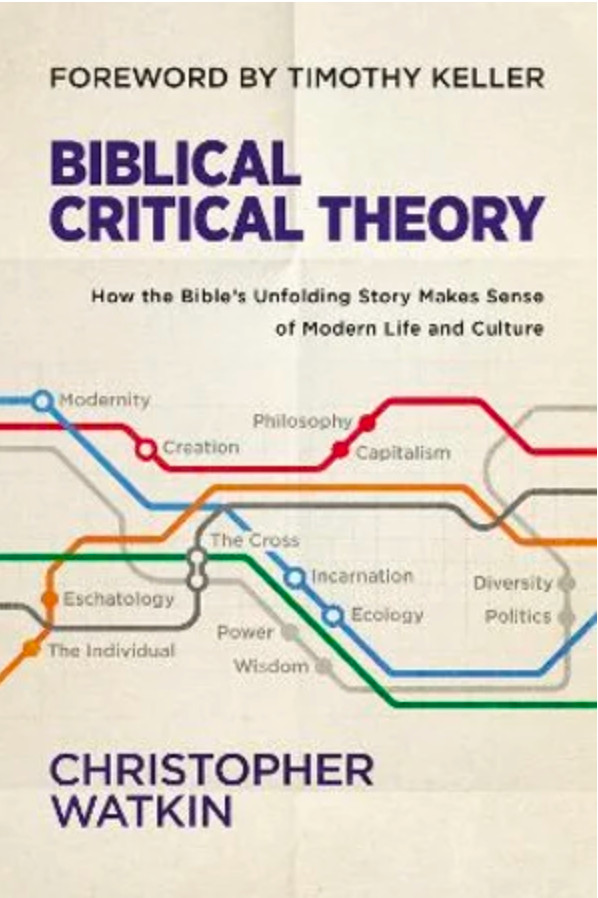An Obadiah Slope Column
Monash University’s Chris Watkin deserved to win the Australian Christian Book of the Year for his Biblical Christian Theory, for sure. No question. And your scribe, Obadiah, is reading it. As Captain Oates, a member of the ill-fated Scott expedition to the South Pole, said on leaving the tent to die in a blizzard, “I may be some time.”
Biblical Critical Theory, at 605 pages of densely written words from a brilliant mind who seems to have read every work on modern philosophy, is a tremendous read.
But there is an easy way in. You could look at what whetted Obadiah’s appetite for the real thing.
New College at UNSW recently had Dr Watkin give three lectures – and now they are free on the internet. Obadiah was there and felt everybody else should have been.
The lectures are not the book, but they make Watkin’s critique of modern society and the thinking that makes us think the way we do pretty accessible. They are well worth a couple of hours.
Find them here on Youtube.
###

Subversion: Here’s how Watkin sees the Bible as subverting the market system’s latest iteration – that encourages us to be our own brand. How do we resist being swallowed by this system? If we try to rebel, the risk is late capitalism sooner or later will appropriate our rebellion. Think of what happens to youth cultures.
Here’s a part of The Other Cheek’s summary of lecture 2: To describe how Christianity subverts this system – Watkin digs deep into Galatians 2:20, a verse in the Bible that has long troubled this attendee at Watkin’s lecture. “Paul writes the following: I have been crucified with Christ, and I no longer live, but Christ lives in me. The life I now live in, the body I live by faith in the son of God who loved me and gave himself for me. Hold on, Paul, so you no longer live? Yes, that’s right, but the life you now live, you live. Yes, that’s right.
“And so the logic here is that Paul’s sense of self is passing through the same stages of death and resurrection that Jesus tries himself and endure. There’s a sense in which the self dies or dies to himself and is reborn in a way that’s inextricably entwined with the identity of Jesus… There’s a rich inextricability now to who Paul is and who Christ is. Those two can’t be pulled apart anymore. And again this is raking open those barriers of the self. The strict wall between me and not me is being transgressed and traversed here. So is it me or is it Christ? Yes., says Paul, it certainly is.”
He means it is both, the glory of how we can live now.
###
Mother church: Obadiah thought he might be in trouble when he posted a piece on The Other Cheek, “The Church of England’s proposal to half bless same-sex couples,” and it got linked by “Thinking Anglicans”, a progressive UK site where discussions can be very robust. But at the time of writing, there’s been no onslaught on my antipodean analysis. Phew.
###
Want to know more about Hamas and why they think their strategy will win?: A series by Mark Durie, Senior Research Fellow of the Arthur Jeffery Centre for the Study of Islam at the Melbourne School of Theology is an excellent place to find a quick guide.
His series on Hamas is at https://markdurie.com/a-qa-primer-on-hamas-part-1/
As a sample, here’s how Durie describes the religious motivation of the group
” • Hamas regards victory as a promise of Allah. The Charter states, “The Islamic Resistance Movement aspires to the realization of Allah’s promise,” quoting numerous Quranic verses which speak of this victory. The belief is that if Muslims are only faithful enough in observing Islam, Allah will grant them the victory: those who are pure in heart and firm in action will be successful in war. The Qur’an states that even a small Muslim force will overcome a much larger force: “However often, by the will of Allah, has a small force defeated a big one? Allah is with those who persevere.” (Sura 2:29)
“• Hamas believes the Qur’an’s teaching that terror will work to make your enemy give up. As the Qur’an says, “Strike terror into your enemies.” (Sura 8:60).
“• There is teaching in the Qur’an that Jews are by nature war-mongering aggressors. (Sura 5:64) \By this logic, Jews are incapable of living in peace with their neighbours, and it is inevitable that they will attack Muslim neighbours. From this perspective, peace is not an option for Palestinians: only a Palestinian victory can solve the supposed problem of Jewish aggression.
“• At the same time, there is another teaching in the Qur’an that, when push comes to shove, Jews will not fight. They are claimed to be too ‘greedy for life’, while Muslims love death (Surah 2:94-96, 62:6). Thus the Hamas military commander, Mohammad Deif, recently spoke of the need to make Israelis understand that their “time is up”. Inspired by the Qur’an, radical Islamic groups have declared many times over the years that victory is just around the corner.”
###
Worst piece of writing this week: It’s been taken down now, but a progressive Methodist leader chose this week to write, “We are all hostages now. We are in the grip of religious fundamentalism. This fundamentalism will not let us go.” It is hard to think that he was not consciously writing against the Hamas seizing of hostages from Israel.
The writer went on to talk of progressives being held hostage in the United Methodist Church (UMC), which has consistently voted to have conservative views on LGBTQIA issues. But the US part of the UMC is ending up in the hands of progressives, with evangelical churches, some 7000 of them voting to leave by the end of this year. The process for a church leaving the UMC is called disaffiliation.
“It is hard to tell if we are alive or dead. We exist in limbo while disaffiliation agreements are negotiated and ratified. We are hostage to a process. It is hard to imagine that paper ballots, votes taken via Zoom, and the fait accompli of actions taken at church and annual conferences have the same power as a person with a gun or knife, but they do force unwilling participants to acquiesce to certain realities they might not usually accept because they are in untenable and situations where the outcome is predetermined. Sometimes, hostages make moral compromises to stay alive and sane. Some of us have been forgotten, left behind, and no longer believed to be worth bargaining for. Others remain hopeful that someone is coming to rescue them from the fundamentalist and proto-fascist nightmare they’ve lived for the past years. So, we are hostages.”
He’s entitled to his strong views, but the rule about the Holocaust surely applies. Jewish people don’t like the rest of us using it as a metaphor. So we don’t.
Even though, as has been reported, he’s a progressive pastor whose church voted to be one of the conservative churches leaving the UMC. He’s understandably upset because he’s a pastor whose church voted to leave him in effect.
Here’s a sample of the discussion. I think the critics had a point.
But he’s in the US, a place full of people with guns. Sigh.
Best piece of Journalism of the week: the award goes curiously enough to Domain, the real estate section that commonly incites house envy. But this piece does not. “After a lifetime of living in refugee camps, two brothers gift their parents the Australian dream of property ownership.” Kudos to the Commonwealth Bank employee who made it happen.
(The “Best Piece of Journalism Award” is judged based on what makes Obadiah cry.)

